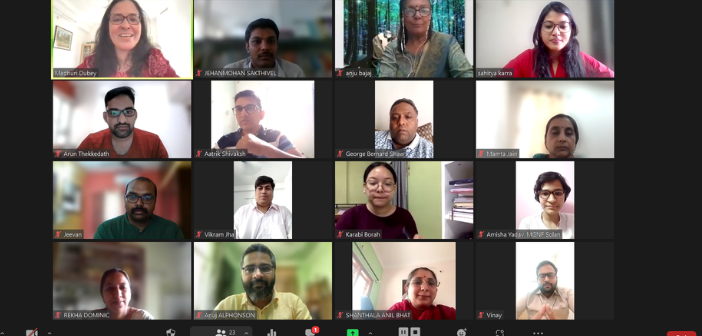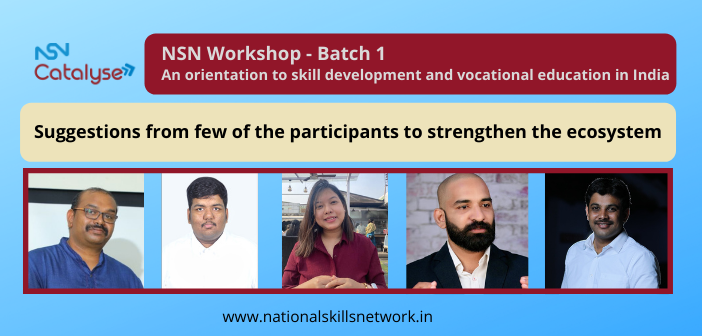National Skills Network (NSN) has successfully launched and organised an online interactive workshop series called the “NSN Catalyse”. The first workshop in this series is titled “Skill development and vocational education in India: An orientation workshop”.
The interactive workshop had carefully curated activities to lead to intellectual discussions and debates. The participants of the workshop interacted and enthusiastically participated in the workshop. The interactivity and pre-workshop activities, have led to some learning outcomes and also some action points that can be taken up by various stakeholders in the domain of skill development and vocational education. Out of the 25 registered participants, 19 members have actively participated in the workshop.
 We shared three questions for the final activity. Most of the participants answered the question – “What are the top 5 ideas to enhance youth employability?”
We shared three questions for the final activity. Most of the participants answered the question – “What are the top 5 ideas to enhance youth employability?”
Today, youth want to be employable and earn a sustainable livelihood. The increase in the rate of youth employability is directly linked to the increase in the country’s economic development. Hence, awareness programmes and skill development training should be conducted wherever and whenever possible, especially in rural areas. Vocational education is one of the means that will help in enhancing youth employability.
Let’s look at the five responses/ideas shared by few of the participants in this regard –
Karabi Borah, MGNF Fellow, IIM Lucknow and MSDE
- Working around to create awareness and sensitise the concerned stakeholders on the benefits of skill development especially parents initially as the majority of candidates who opt for skill development training (PMKVY, DDU-GKY) are school dropouts and are engaged in some of the other petty jobs and are not in support of leaving the existing job and opt for three to four months training. The benefit of having a skill certificate has to be reiterated.
- On the demand side, the industry has to be rigorously sensitised on the capacity of the candidates who have done skill development training. This along with apprenticeship promotion which is now open for optional trades has to be promoted. The idea is to create a smooth demand-supply market of skilled manpower.
- Most training partners or organisations do not do aspiration mapping of candidates during the mobilization stage. This leads to mismatch and many students drop out during training or after joining as it does not resonate. Therefore, it is very important to map the candidate’s aspirations which will lead to a focused career path that is best suitable for the candidate.
- The District Skill Committees should take an active interest and part in strengthening the skill ecosystem in the district. The committee should conduct periodic demand studies of actual manpower requirements in the district. This information then needs to be disseminated to the relevant stakeholders.
- Focus on improving the soft skill of candidates apart from domain knowledge.
Jehanmohan S, Teacher and Industry Collaboration Manager, Nachimuthu Polytechnic College
- MSME as the providers of technical and vocational education
MSME could become informal education providers by giving work-based learning programs such as apprenticeships, internships, and industry visits to vocational training institutes. MSME could become a formal education partner by delivering complementary educational services by collaborating with academia. MSME shall establish a centre of excellence on the college premises. MSMEs could give education in a variety of sectors. This will enable youth to enhance industry-relevant skills for getting jobs. The valuable contribution of MSME will certainly reduce the skill gap of youth (aged between 15-24) and will make the youth industry ready and employable.
- Promoting entrepreneurial mindset amongst youth through various initiatives
Awareness of entrepreneurship as a career option should be made at secondary and higher secondary levels. The subject of entrepreneurship shall be made mandatory. A business incubation centre at the town level shall be established to help individuals brainstorm and focus on viable business ideas.
- Contribution of academia to youth employability
Delivering an industry-based curriculum to the youth by the colleges will reduce the skill gaps.
- Improve access to finance
Financial resources are very much essential for any individual to establish an enterprise. Capital investment through govt schemes shall be available at the village level for the youth. Youth shall use the capital to begin the enterprise with the skills acquired.
5. Conducting Skill contests or Business contests
By announcing the contest for youth at the town level, a youth network shall be established. The skills levels of the youth shall be evaluated and given support to them for upskilling. This will open the avenues for business start-ups.
 Arun Thekkedath, Associate Director, QS
Arun Thekkedath, Associate Director, QS
- It is evident that the future landscape of careers is uncertain to us but what we know is that people having the 3Cs – Compassion, Character and Critical thinking can certainly strive in any environment and can excel in their careers.
- This is one of the top skills that our youths should have to become employable, as many corporates, in general, give equal importance to a candidate’s communication skills compared to their technical competencies.
- The educational systems need to be restructured in such a way that students are learning the importance of teamwork starting from early childhood to higher education. The ability to be a team player is one of the top skills that employers value nowadays.
- During this era of the digital revolution, our youths must have access to the right tools, knowledge, and techniques to adapt and survive.
- This should be the critical area that the governments, institutions, and educators need to give more emphasis on while planning to enhance employability. Integrating industry-relevant internships/apprenticeships will be a game-changer in our academic systems.
Jeevan Kumar, Development worker, Quest Alliance
- The learners in skilling centres must be engaged through interactive sessions with facilitators – these must be through discussions, reflections, and activities including one to create awareness of market needs.
- Keep using technology innovatively to develop an interactive audio-visual platform that can be accessed by learners on various platforms. Efforts must be made to bridge the digital divide.
- Regular engagement with various stakeholders – students, alumni, parents, industry, Government, academics, activists and NGOs.
- Make skilling aspirational – this involves ensuring the dignity of labour by working with employers to ensure they provide higher wages to skilled workforce vs unskilled workforce.
- Keep doing regular checks on whether the training courses are in alignment with market needs. This will ensure quality placements. And quality placements will become a benchmark to attract more learners toward skilling.
- Create aspirational career pathways for facilitators in skilling centres. This will attract good talent to this critical position for quality training.
Also Read: Skill development and vocational education in India: An orientation workshop https://nationalskillsnetwork.in/skill-development-and-vocational-education-in-india-an-orientation-workshop/
The participants have also responded to the question – “What are the 5 ways to bring skills and education together?”
Sutheendran, Management Trainee, Skillveri Training Solutions Pvt. Ltd
- Bringing awareness of the need for skills in education and current employment situation to parents. They are the ones that should be leading the way towards bringing skill and education together.
- Starting early is a fine way to do it. Students should be introduced to skilling at an early stage of their education. This way they would be proficient in a minimum of one skill when they complete their schooling.
- Students should be encouraged to find their interests and also taught to be proficient in the skills.
- Introducing technologies like AR/VR, Robotics as a means or as a platform through which the skills are taught. Usage of technology will help them in understanding concepts way easier than the conventional means.
- Backing skill learning from the government and change in the education system will prove effective.
The first workshop was successful with such active responses from the participants during the session as well as in the workshop activities. The activities have created opportunities for people to participate in and discuss initiatives from the government in skilling and vocational education.













